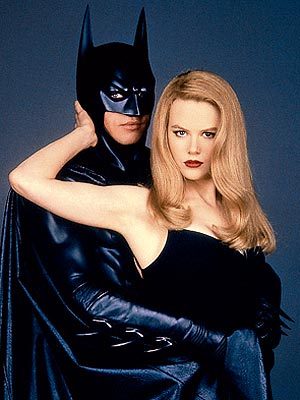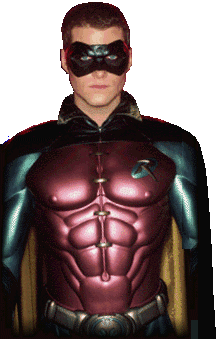Let's get this out there right now: Batman and Robin will be the lowest movie on the review list. I say that because the next few sentences may upset some who identify Batman as the ultimate in brooding heroism.
Batman Forever is actually a good Batman film. It may be the best of the Tim Burton/Joel Schumacher series.
Is this movie brighter and lighter in the tone? Yes it is, but let's not pretend that they went into full camp mode on this one.
The film this go-around begins with Tommy Lee Jones playing Two-Face and taking a bunch of people hostage.
This is where I do have a major criticism: Tommy Lee Jones is not a good Two-Face. He starts out serviceable and then goes completely over the top and is absolutely the biggest detraction from the plot.
I'd have preferred if Billy Dee Williams from the 1989 film had gotten the role because I think he'd have played it wisely, but let's just focus on the critiques of Jones. First off, his use of the coin is pointless.
Two-Face's ideology (and Jones even says this in his first lines) is that true justice and fairness can only be found in chance, so the coin represents a 50/50 chance as to whether he should act sadistically or in kindness. Here, he's less bipolar and more OCD - like he knows what he will do but wants the coin's permission before he does it.
This first toss is the first example of it: He tosses, it lands on heads, so he can't kill the hostage. Instead, he ties him up, uses him as bait for Batman, and prepares to burn Batman (and the hostage by circumstantial extension) in acid. Two-Face does NOT act in copouts, and this was insulting to the character.
Anyway, Batman escapes Two-Face's vault trap and defies the laws of physics to return the hostage to safety. (I wasn't a fan of that.) But before all of this, Batman meets Dr. Chase Meridian, played by Nicole Kidman. Chase is quite possibly the best pure love interest in any Batman film. The romance flows fairly naturally and creates the theme of this film that, to me, made the film awesome.
And then we meet the Riddler. Well, Edward Nygma, the man who becomes the Riddler.
He proposes his invention to Bruce Wayne, which alters people's brain waves to make them feel like they're in the TV shows, but is shot down because his work "Just raises too many questions."
OK, I know many liked Michael Keaton because of his awesome job as Batman, but much like how Andrew Garfield is getting overshadowed by his Spidey predecessor, Val Kilmer gets overshadowed by being the best Bruce Wayne EVER. He's able to be brilliant, ethical, and at times a likable billionaire playboy, while at the same time show the dark and brooding nature that lives within the character.
It really makes me wish that he and Schumacher got along better because I think the next film could have been less crap with him in the role.
Anyway, the next scene is of Kilmer as Batman talking with Meridian, who apparently has a Bat-fetish.
The dialogue for Batman is what really is an annoyance in this film. I don't have any issues with it that would detract heavily from enjoying the film, but so many lines felt like Schumacher tried too hard to make Batman a badass. He's Batman! He's already badass - just do enough dialogue to get the point across. Lecturing on how the Bat-signal is not a toy is excessive.
The main theme of this film was that Bruce was having repressed memories of the night his parents died, and this ultimately comes to a head as he ponders whether or not he should continue as Batman.
When Bruce goes to Meridian about this, he invites her to the circus, where the Flying Graysons perform. Two-Face invades and sets up a bomb to kill everyone in the tent. The Graysons try to stop the bomb, and Dick succeeds in throwing it out of the tent, but his family all falls to their deaths.
This is a change from the Tony Zucco story, but I don't really mind it here. The big reason is that it gave the nobility of the Graysons to viewers. They weren't just faceless characters; they were decent people who got caught up in an unfortunate circumstance.
Bruce feels guilty about all this, and he actually has a Freudian slip when he tells Alfred that "he killed them," showing the responsibility he feels not only for Dick's parents but his own. I loved this tacked on bit of cruelty that can only work with Batman.
It's also nice to see the Batman and Robin relationship as it's just starting out. Because the focus is so much on them getting used to each other, that leaves little time for it to become an innuendo festival.
Grayson, played by Chris O'Donnell, is pretty whiny in this film, but it's not constant and it can be understood given the proximity to his family's death. He's focused on killing Two-Face for revenge, but Bruce warns against it, seemingly drawing to his own experiences when the Joker's death gave him no closure (a nice tie-back to the original film).
Two-Face's success at the circus draws the attention of Riddler, who I must say stole the show. Jim Carrey is the focus of almost every scene he's in, and he's so energized that it carries scenes that shouldn't have been good. While over the top at times, he fit the tone of the film and still managed to give an off-putting vibe similar to the Joker. It is a drawback, though, because it becomes very clear that Jones' Two-Face is weak when he's compared against Riddler.
Anyway, Riddler proposes that Two-Face fund his brain wave machine, which happens to also allow him to absorb people's intelligence (discovered just before he killed his old supervisor, a nice bit of darkness to the film). Two-Face then manages to operate his coin toss properly for the only time when he says that Heads means they'll join forces while Tails means, "I blow your head off."
It winds up being Heads, and Nygma gains major success, even greater than Wayne's. At a gala event, Nygma reveals a new invention that will (secretly) map out the human memory bank, as he tells this annoying journalist. I don't know her name, but in both films she's in I want to punch her.
Bruce is smart enough to shut down the machine before examining it, but Nygma outwits him and still gets access to his memories, where he finds he's Batman. I love how smart the Riddler's plans seem to be here, as he is the only villain with comparable intelligence to Batman. The riddles in this film are expertly crafted and it embodies the character perfectly.
Meridian decides to be with Bruce instead of Batman, to his delight, leading to the single-worst moment of Kilmer's Batman. It seriously is my biggest single second of anger at this film:
 |
| May it haunt your nightmares for all eternity! |
So Bruce gives up being Batman and prepares to tell Meridian the truth, which he unintentionally does through his kiss and what may be one of the best-executed flashbacks in superhero history.
However, it's broken up by Two-Face and Riddler, who have Bruce beaten, but Two-Face restrains at Riddler's request. (Which is STUPID! He didn't even toss the coin to decide. He just decided to be an idiot.) Bruce's Batcave is destroyed in the process, as is the original suit, and it leads to Robin's addition to the final fight and the lead-in to the horrifying Batman and Robin suits.
The duo come full force, but Robin decides not to kill Two-Face, leading to his capture. Riddler then leaves Batman the choice between Chase and Dick. He ultimately destroys the base and is able to outwit the Riddler and snatch up both on the way down the chasm of death.
Finally, he disorients Two-Face, which leads to his death, and Riddler is beaten by Bruce, who decides that he will continue to be Batman not because he must, but because he chooses to. And he chooses that Bruce and Batman are one and the same, not distinct individuals as his mind had long held.
If this film was taken as the final leg of a trilogy, I'd say it actually rounds out Batman nicely. He is no longer a brooding, emotionally stunted man; he is a hero who has come to terms with his past. Robin isn't a vengeful monster; he becomes a moral person who can rise above his pain.
I think this film represents a great closure to Tim Burton's connection to the character, but it gets flack for what it represents. Batman Forever is meant as a conclusion, but when it extended, what had been left was not a strong story. Everyone was in a good place, and Bruce had a strong female relationship that could be ended with.
A fourth film would need a visionary that could take the Batman-Robin dynamic to a new place, maybe even grow Dick into his own hero, Nightwing. (Spin-off anyone?) Instead, more characters were thrown in, Chase Meridian vanished and we get what will be my most rage-filled critique, Batman and Robin.
All of that said, what follows up this film has nothing to do with grading this one, and this one is really good. I hate that Two-Face is so botched, but he had his moments, and Riddler makes up for it. More importantly, the civilian characters feel far more human here and I can sink myself into a story that I wish was done as a focus more often: Bruce struggling with his dual identity.
Yes, Gotham is way brighter than it had been, but it still felt like Gotham. There's a lot of elements that I will criticize next time that were introduced here, but here, they came naturally and were controlled so that I could understand them.
Overall, I give Batman Forever 3 out of 4 stars and 7.7 out of 10. It's got a lot of issues, but what it changes from the comic works (Two-Face excluded) and it got a good balance between kid appeal and mainstream adult appeal by being dark while not terrifying people with disturbing characterizations.
Prepare for insanity tomorrow, because here comes Batman and Robin.
-- 'Like' the blog's Facebook page at http://www.facebook.com/#!/SeanNetworkBlogs
-- Follow my Twitter at twitter.com/seantherebel




No comments:
Post a Comment